高一英语一般将来时各地方试卷集合汇编含解析
(英语)高一英语试卷分类汇编英语一般将来时(及答案)
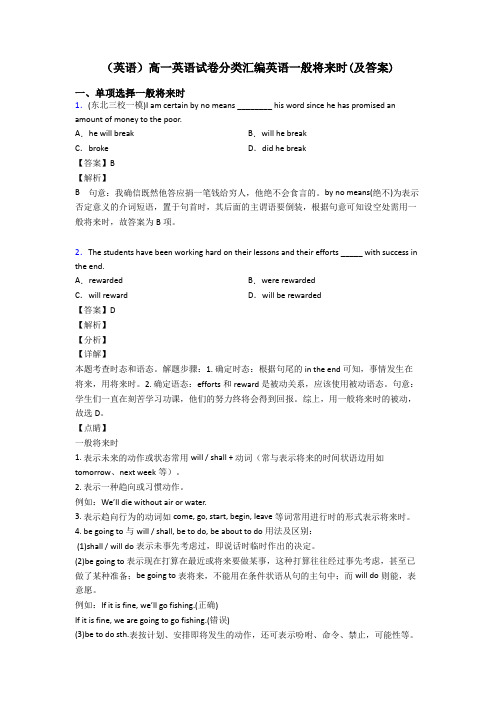
(英语)高一英语试卷分类汇编英语一般将来时(及答案)一、单项选择一般将来时1.(东北三校一模)I am certain by no means ________ his word since he has promised an amount of money to the poor.A.he will break B.will he breakC.broke D.did he break【答案】B【解析】B句意:我确信既然他答应捐一笔钱给穷人,他绝不会食言的。
by no means(绝不)为表示否定意义的介词短语,置于句首时,其后面的主谓语要倒装,根据句意可知设空处需用一般将来时,故答案为B项。
2.The students have been working hard on their lessons and their efforts _____ with success in the end.A.rewarded B.were rewardedC.will reward D.will be rewarded【答案】D【解析】【分析】【详解】本题考查时态和语态。
解题步骤:1. 确定时态:根据句尾的in the end可知,事情发生在将来,用将来时。
2. 确定语态:efforts和reward是被动关系,应该使用被动语态。
句意:学生们一直在刻苦学习功课,他们的努力终将会得到回报。
综上,用一般将来时的被动,故选D。
【点睛】一般将来时1. 表示未来的动作或状态常用will / shall + 动词(常与表示将来的时间状语边用如tomorrow、next week等)。
2. 表示一种趋向或习惯动作。
例如:We’ll die without air or water.3. 表示趋向行为的动词如come, go, start, begin, leave等词常用进行时的形式表示将来时。
4. be going to与will / shall, be to do, be about to do用法及区别:(1)shall / will do表示未事先考虑过,即说话时临时作出的决定。
高考英语专题汇编一般将来时(一)及解析
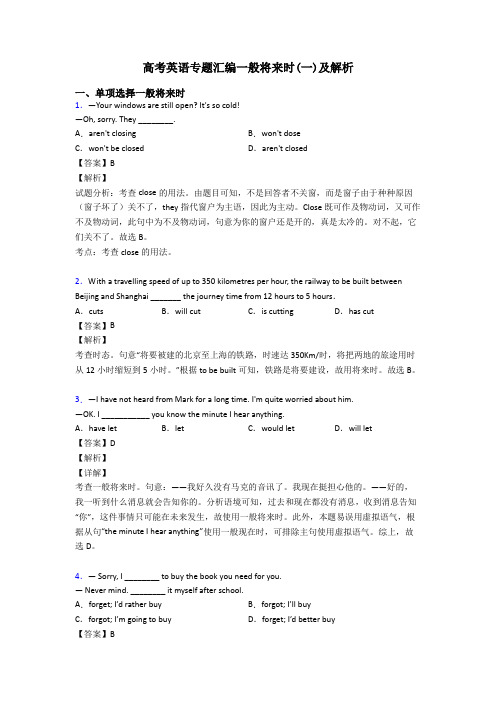
高考英语专题汇编一般将来时(一)及解析一、单项选择一般将来时1.—Your windows are still open? It's so cold!—Oh, sorry. They ________.A.aren't closing B.won't doseC.won't be closed D.aren't closed【答案】B【解析】试题分析:考查close的用法。
由题目可知,不是回答者不关窗,而是窗子由于种种原因(窗子坏了)关不了,they指代窗户为主语,因此为主动。
Close既可作及物动词,又可作不及物动词,此句中为不及物动词,句意为你的窗户还是开的,真是太冷的。
对不起,它们关不了。
故选B。
考点:考查close的用法。
2.With a travelling speed of up to 350 kilometres per hour, the railway to be built between Beijing and Shanghai _______ the journey time from 12 hours to 5 hours.A.cuts B.will cut C.is cutting D.has cut【答案】B【解析】考查时态。
句意“将要被建的北京至上海的铁路,时速达350Km/时,将把两地的旅途用时从12小时缩短到5小时。
”根据to be built可知,铁路是将要建设,故用将来时。
故选B。
3.—I have not heard from Mark for a long time. I'm quite worried about him.—OK. I ___________ you know the minute I hear anything.A.have let B.let C.would let D.will let【答案】D【解析】【详解】考查一般将来时。
最新高一英语一般将来时题20套(带答案)
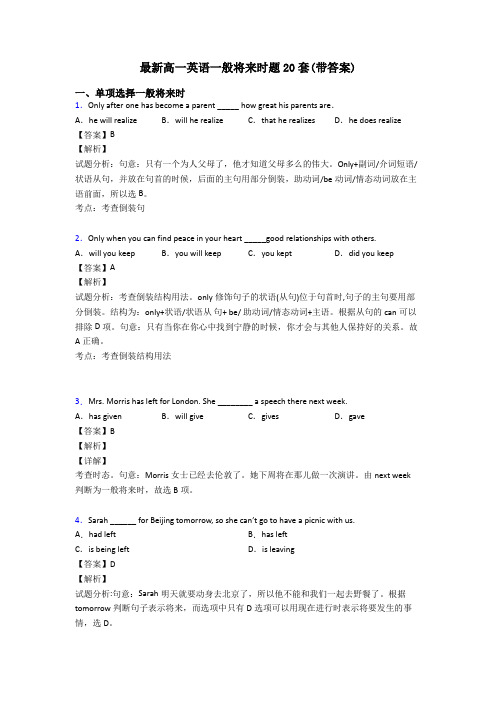
最新高一英语一般将来时题20套(带答案)一、单项选择一般将来时1.Only after one has become a parent _____ how great his parents are.A.he will realize B.will he realize C.that he realizes D.he does realize 【答案】B【解析】试题分析:句意:只有一个为人父母了,他才知道父母多么的伟大。
Only+副词/介词短语/状语从句,并放在句首的时候,后面的主句用部分倒装,助动词/be动词/情态动词放在主语前面,所以选B。
考点:考查倒装句2.Only when you can find peace in your heart _____good relationships with others.A.will you keep B.you will keep C.you kept D.did you keep【答案】A【解析】试题分析:考查倒装结构用法。
only修饰句子的状语(从句)位于句首时,句子的主句要用部分倒装。
结构为:only+状语/状语从句+ be/ 助动词/情态动词+主语。
根据从句的can可以排除D项。
句意:只有当你在你心中找到宁静的时候,你才会与其他人保持好的关系。
故A正确。
考点:考查倒装结构用法3.Mrs. Morris has left for London. She ________ a speech there next week.A.has given B.will give C.gives D.gave【答案】B【解析】【详解】考查时态。
句意:Morris女士已经去伦敦了。
她下周将在那儿做一次演讲。
由next week 判断为一般将来时,故选B项。
4.Sarah ______ for Beijing tomorrow, so she can’t go to have a picnic with us.A.had left B.has leftC.is being left D.is leaving【答案】D【解析】试题分析:句意:Sarah明天就要动身去北京了,所以他不能和我们一起去野餐了。
【英语】高考英语专题汇编一般将来时(一)及解析

【英语】高考英语专题汇编一般将来时(一)及解析一、单项选择一般将来时1.—Tom is so joyful that he smiles at everyone.—So ________ you if you get the first in the exam.A.do B.areC.would D.will【答案】D【解析】句意为:——汤姆如此高兴以致于见人就笑。
——如果你考试得了第一,你也会这样。
条件状语从句(if...)若用一般现在时,则主句要用一般将来时;此句相当于:You will also be so joyful if you get the first in the exam.。
2.---I don’t know when _____ tomorrow.---I will call you as soon as he_____.A.will he come; arrives B.he will come; arrivesC.he will come; will arrive D.will he come; will come【答案】B【解析】考查时态。
第一句为when 引导的宾语从句,从句的时态,要根据时态本身来决定,第二句为if 引导的条件状语,主句为一般将来时,从句要用一般现在时,代替将来时,故选答案为B3.—Guess what, we've got our visas for a short-term visit to the UK this summer.—How nice! You ________ a different culture then.A.will be experiencing B.have experiencedC.have been experiencing D.will have experienced【答案】A【解析】【详解】考查时态。
(英语)高考英语一般将来时题20套(带答案)及解析
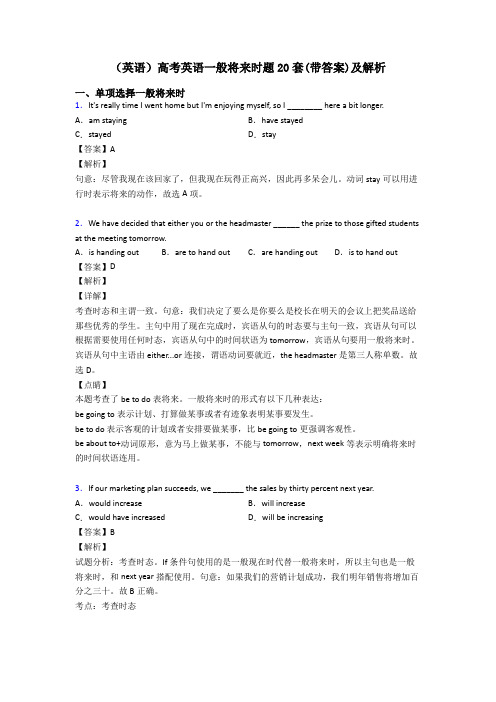
(英语)高考英语一般将来时题20套(带答案)及解析一、单项选择一般将来时1.It's really time I went home but I'm enjoying myself, so I ________ here a bit longer.A.am staying B.have stayedC.stayed D.stay【答案】A【解析】句意:尽管我现在该回家了,但我现在玩得正高兴,因此再多呆会儿。
动词stay可以用进行时表示将来的动作,故选A项。
2.We have decided that either you or the headmaster ______ the prize to those gifted students at the meeting tomorrow.A.is handing out B.are to hand out C.are handing out D.is to hand out【答案】D【解析】【详解】考查时态和主谓一致。
句意:我们决定了要么是你要么是校长在明天的会议上把奖品送给那些优秀的学生。
主句中用了现在完成时,宾语从句的时态要与主句一致,宾语从句可以根据需要使用任何时态,宾语从句中的时间状语为tomorrow,宾语从句要用一般将来时。
宾语从句中主语由either...or连接,谓语动词要就近,the headmaster是第三人称单数。
故选D。
【点睛】本题考查了be to do表将来。
一般将来时的形式有以下几种表达:be going to表示计划、打算做某事或者有迹象表明某事要发生。
be to do 表示客观的计划或者安排要做某事,比be going to更强调客观性。
be about to+动词原形,意为马上做某事,不能与tomorrow,next week等表示明确将来时的时间状语连用。
3.If our marketing plan succeeds, we _______ the sales by thirty percent next year.A.would increase B.will increaseC.would have increased D.will be increasing【答案】B【解析】试题分析:考查时态。
【英语】高考英语一般将来时真题汇编(含答案)
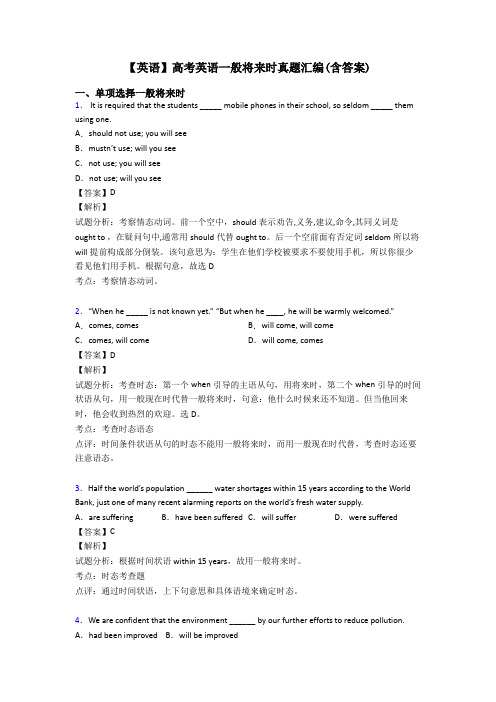
【英语】高考英语一般将来时真题汇编(含答案)一、单项选择一般将来时1. It is required that the students _____ mobile phones in their school, so seldom _____ them using one.A.should not use; you will seeB.mustn’t use; will you seeC.not use; you will seeD.not use; will you see【答案】D【解析】试题分析:考察情态动词。
前一个空中,should表示劝告,义务,建议,命令,其同义词是ought to ,在疑问句中,通常用should代替ought to。
后一个空前面有否定词seldom所以将will提前构成部分倒装。
该句意思为:学生在他们学校被要求不要使用手机,所以你很少看见他们用手机。
根据句意,故选D考点:考察情态动词。
2.“When he _____ is not known yet.” “But when he ____, he will be warmly welcomed.”A.comes, comes B.will come, will comeC.comes, will come D.will come, comes【答案】D【解析】试题分析:考查时态:第一个when引导的主语从句,用将来时,第二个when引导的时间状语从句,用一般现在时代替一般将来时,句意:他什么时候来还不知道。
但当他回来时,他会收到热烈的欢迎。
选D。
考点:考查时态语态点评:时间条件状语从句的时态不能用一般将来时,而用一般现在时代替,考查时态还要注意语态。
3.Half the world’s population ______ water shortages within 15 years according to the World Bank, just one of many recent alarming reports on the world’s fresh water supply.A.are suffering B.have been suffered C.will suffer D.were suffered【答案】C【解析】试题分析:根据时间状语within 15 years,故用一般将来时。
【英语】高中英语一般将来时各地方试卷集合汇编含解析
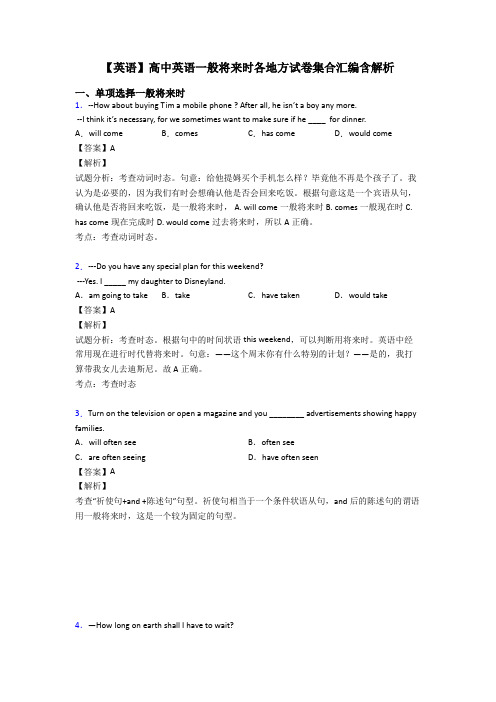
【英语】高中英语一般将来时各地方试卷集合汇编含解析一、单项选择一般将来时1.--How about buying Tim a mobile phone ? After all, he isn’t a boy any more.--I think it’s necessary, for we sometimes want to make sure if he ____ for dinner.A.will come B.comes C.has come D.would come【答案】A【解析】试题分析:考查动词时态。
句意:给他提姆买个手机怎么样?毕竟他不再是个孩子了。
我认为是必要的,因为我们有时会想确认他是否会回来吃饭。
根据句意这是一个宾语从句,确认他是否将回来吃饭,是一般将来时, A. will come一般将来时 B. comes一般现在时 C. has come现在完成时 D. would come过去将来时,所以A正确。
考点:考查动词时态。
2.---Do you have any special plan for this weekend?---Yes. I _____ my daughter to Disneyland.A.am going to take B.take C.have taken D.would take【答案】A【解析】试题分析:考查时态。
根据句中的时间状语this weekend,可以判断用将来时。
英语中经常用现在进行时代替将来时。
句意:——这个周末你有什么特别的计划?——是的,我打算带我女儿去迪斯尼。
故A正确。
考点:考查时态3.Turn on the television or open a magazine and you ________ advertisements showing happy families.A.will often see B.often seeC.are often seeing D.have often seen【答案】A【解析】考查“祈使句+and +陈述句”句型。
(英语)高三英语一般将来时各地方试卷集合汇编含解析

(英语)高三英语一般将来时各地方试卷集合汇编含解析一、单项选择一般将来时1.—Help me out in the kitchen and I ________ you to a cup of coffee.—Sounds good.A.will treat B.treatC.am treating D.have treated【答案】A【解析】考查时态。
句意:——要是你在厨房里帮我忙的话,我将请你喝咖啡。
——听起来不错。
根据对话语境可知,应用一般将来时。
2.If Kate goes to the gym this weekend, _______.A.so do I B.so I doC.so will I D.so I will【答案】C【解析】试题分析:句意:如果凯特这个周末去体育馆,我也去。
If引导的条件状语从句用一般现在时态表示一般将来时态,主句用一般将来时态;又因为前句说Kate去体育馆,后句说I也去体育馆,故用全部倒装。
故选C。
考点:考查时态和全部倒装句。
3.Turn on the television or open a magazine and you ________ advertisements showing happy families.A.will often see B.often seeC.are often seeing D.have often seen【答案】A【解析】考查“祈使句+and +陈述句”句型。
祈使句相当于一个条件状语从句,and后的陈述句的谓语用一般将来时,这是一个较为固定的句型。
4.—May I speak to your manager at 4:00 this afternoon?—Sorry, sir. He ________ to a meeting soon.A.would go B.has gone C.will have gone D.is going【答案】D【解析】试题分析:句意:我今天下午4点能和你们总经理说话吗?---对不起先生,他很快就去开会了。
【英语】高三英语一般将来时各地方试卷集合汇编含解析

【英语】高三英语一般将来时各地方试卷集合汇编含解析一、单项选择一般将来时1.The sky is clouding over;we can see there ________ a rainstorm.A.is going to be B.is going to haveC.will be D.will have【答案】A【解析】句意:天空乌云密布,看来要有暴风雨来临。
根据某种迹象表明将要发生某事,用be going to do sth,且有there be结构,故选A项。
2.Mrs. Morris has left for London. She ________ a speech there next week.A.has given B.will give C.gives D.gave【答案】B【解析】【详解】考查时态。
句意:Morris女士已经去伦敦了。
她下周将在那儿做一次演讲。
由next week 判断为一般将来时,故选B项。
3.Only when you can find peace in your heart _____good relationships with others.A.will you keep B.you will keep C.you kept D.did you keep【答案】A【解析】试题分析:考查倒装结构用法。
only修饰句子的状语(从句)位于句首时,句子的主句要用部分倒装。
结构为:only+状语/状语从句+ be/ 助动词/情态动词+主语。
根据从句的can可以排除D项。
句意:只有当你在你心中找到宁静的时候,你才会与其他人保持好的关系。
故A正确。
考点:考查倒装结构用法4.AC Milan has confirmed that the England star David Beckham ______the team soon. A.has rejoined B.was going to rejoinC.rejoined D.is to rejoin【答案】D【解析】试题分析:考查时态。
【英语】高一英语一般将来时专项训练及答案及解析
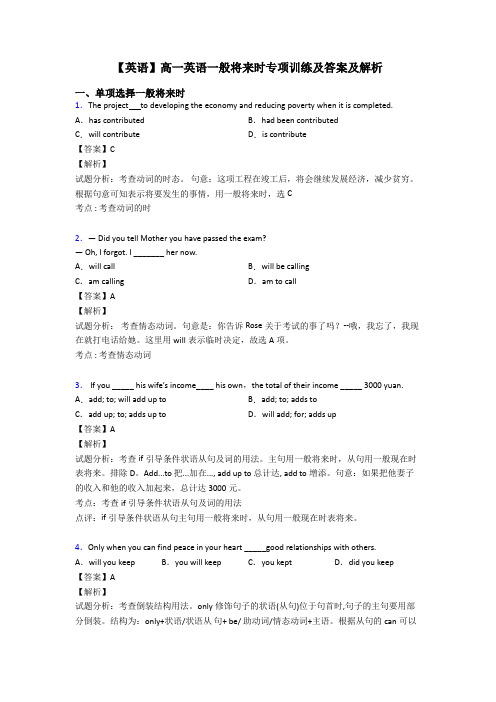
【英语】高一英语一般将来时专项训练及答案及解析一、单项选择一般将来时1.The project to developing the economy and reducing poverty when it is completed. A.has contributed B.had been contributedC.will contribute D.is contribute【答案】C【解析】试题分析:考查动词的时态。
句意:这项工程在竣工后,将会继续发展经济,减少贫穷。
根据句意可知表示将要发生的事情,用一般将来时,选C考点 : 考查动词的时2.— Did you tell Mother you have passed the exam?— Oh, I forgot. I _______ her now.A.will call B.will be callingC.am calling D.am to call【答案】A【解析】试题分析:考查情态动词。
句意是:你告诉Rose关于考试的事了吗?--哦,我忘了,我现在就打电话给她。
这里用will表示临时决定,故选A项。
考点 : 考查情态动词3.If you _____ his wife’s income____ his own,the total of their income _____ 3000 yuan. A.add; to; will add up to B.add; to; adds toC.add up; to; adds up to D.will add; for; adds up【答案】A【解析】试题分析:考查if引导条件状语从句及词的用法。
主句用一般将来时,从句用一般现在时表将来。
排除D。
Add...to 把...加在..., add up to总计达, add to增添。
句意:如果把他妻子的收入和他的收入加起来,总计达3000元。
高一英语一般将来时各地方试卷集合汇编及解析

高一英语一般将来时各地方试卷集合汇编及解析一、单项选择一般将来时1.The sky is clouding over;we can see there ________ a rainstorm.A.is going to be B.is going to haveC.will be D.will have【答案】A【解析】句意:天空乌云密布,看来要有暴风雨来临。
根据某种迹象表明将要发生某事,用be going to do sth,且有there be结构,故选A项。
2.Close the door of fear behind you, and you ______ the door of faith open before you. A.will see B.have seenC.are seeing D.Saw【答案】A【解析】试题分析:句意:关掉你身后的恐惧之门,你就能看到你前面敞开的信念之门。
祈使句的句型:动词原形+ and you will表示并列,动词原形+ or you will表示转折。
A. will see 一般将来时 B. have seen现在完成时 C. are seeing 现在进行时D. saw一般过去时。
根据祈使句的句型特点,故选A。
考点:考查祈使句和动词时态的用法。
3.“When he _____ is not known yet.” “But when he ____, he will be warmly welcomed.”A.comes, comes B.will come, will comeC.comes, will come D.will come, comes【答案】D【解析】试题分析:考查时态:第一个when引导的主语从句,用将来时,第二个when引导的时间状语从句,用一般现在时代替一般将来时,句意:他什么时候来还不知道。
但当他回来时,他会收到热烈的欢迎。
(英语)高一英语将来完成时各地方试卷集合汇编含解析

(英语)高一英语将来完成时各地方试卷集合汇编含解析一、单项选择将来完成时1.--- Is Tom still smoking?--- No. By next Saturday he _____ for a whole month without smoking a single cigarette. A.will go B.will have goneC.goes D.has been going【答案】B【解析】试题分析:考查时态:句意:--汤姆还抽烟吗?--没有,到下周六,他就一整个月没有抽任何一只烟了。
时间是By next Saturday,by引导时间状语的句式中句子的时态用完成时态,因为是next saturday还没有到来,所以应该用将来时态,所以by next Saturday和在一起就是将来时态的完成时态,所以选B。
考点:考查时态2.We__________three quarters of the book by the end of next semester.A.have been learning B.will have learntC.had learnt D.would have learned【答案】B【解析】【详解】考查将来完成时。
句意:到下学期末的时候,我们将学习这本书的四分之三。
根据by the end of next semester可知,时态用将来完成时,故选B。
3.By the time I see you again, I _______ from that school.A.have graduated B.graduated C.will have graduated D.graduate【答案】C【解析】试题分析:句意:到我再次看见你为止,我将已经从那个学校毕业了。
By the time是连词短语,连接时间状语从句,往往和完成时连用,因为时间状语从句是一般现在时,主句是将来完成时,选C。
【英语】高一英语试卷分类汇编英语一般将来时(及答案)含解析

【英语】高一英语试卷分类汇编英语一般将来时(及答案)含解析一、单项选择一般将来时1.The project to developing the economy and reducing poverty when it is completed. A.has contributed B.had been contributedC.will contribute D.is contribute【答案】C【解析】试题分析:考查动词的时态。
句意:这项工程在竣工后,将会继续发展经济,减少贫穷。
根据句意可知表示将要发生的事情,用一般将来时,选C考点 : 考查动词的时2.Only when you can find peace in your heart _____good relationships with others.A.will you keep B.you will keep C.you kept D.did you keep【答案】A【解析】试题分析:考查倒装结构用法。
only修饰句子的状语(从句)位于句首时,句子的主句要用部分倒装。
结构为:only+状语/状语从句+ be/ 助动词/情态动词+主语。
根据从句的can可以排除D项。
句意:只有当你在你心中找到宁静的时候,你才会与其他人保持好的关系。
故A正确。
考点:考查倒装结构用法3.Turn on the television or open a magazine and you ________ advertisements showing happy families.A.will often see B.often seeC.are often seeing D.have often seen【答案】A【解析】考查“祈使句+and +陈述句”句型。
祈使句相当于一个条件状语从句,and后的陈述句的谓语用一般将来时,这是一个较为固定的句型。
4.It’s your own business. If you don’t attach importance to it, who else ?A.does B.was C.has D.will【解析】试题分析:句意:这是你自己的事情,如果你不重视,其他谁会重视呢?因为这句话的条件状语从句用一般现在时代替一般将来时,所以主句用一般将来时。
高一英语将来完成时各地方试卷集合汇编及解析

高一英语将来完成时各地方试卷集合汇编及解析一、单项选择将来完成时1.The train arrives in Liverpool at 10 p.m. tonight . The plane I would like to take fromthere_______by then.A.will leave B.would have left C.will have left D.has left【答案】C【解析】试题分析:考查时态。
本句中的关键词是then,根据上下文可知这里的then表示的是at 10 p.m. tonight这是一个将来的时间,by与完成时连用,故使用将来完成时的时态。
句意:火车在今天晚上10点到达利物浦,在那个时候我要乘的飞机将已经离开了。
故C正确。
考点:考查时态点评:连词by到…时为止;该词经常与完成时连用,如果后面是现在的时间,句中就使用现在完成时;如果后面是过去的时间,就使用过去完成时;如果后面是将来的时间,就使用将来完成时。
2.We__________three quarters of the book by the end of next semester.A.have been learning B.will have learntC.had learnt D.would have learned【答案】B【解析】【详解】考查将来完成时。
句意:到下学期末的时候,我们将学习这本书的四分之三。
根据by the end of next semester可知,时态用将来完成时,故选B。
3. --- I hear that Jason is planning to buy a new car.--- I know. By next month, he ________ enough for a used oneA.has saved B.savesC.will be saving D.will have saved【答案】D【解析】试题分析:考查时态的用法; A现在完成时,表示已经可以买了;B一般现在时,表示经常性,习惯性;C将来进行时,表示将来的某个时候正在进行的动作;从题意可看出是不符合的。
高一英语试卷分类汇编英语一般将来时(及答案)
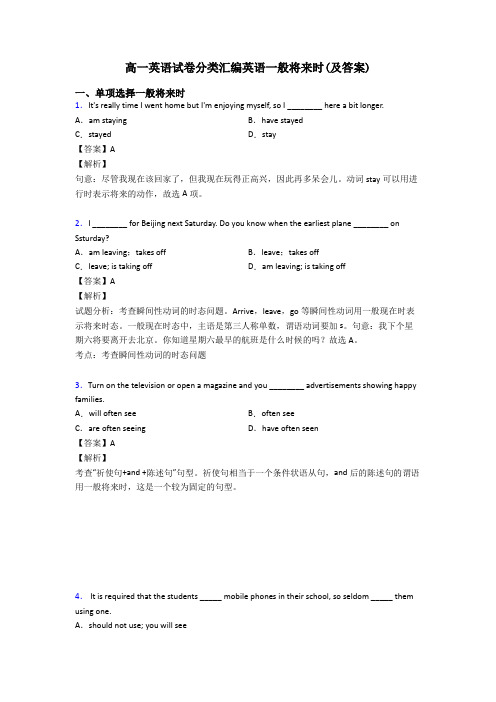
高一英语试卷分类汇编英语一般将来时(及答案)一、单项选择一般将来时1.It's really time I went home but I'm enjoying myself, so I ________ here a bit longer.A.am staying B.have stayedC.stayed D.stay【答案】A【解析】句意:尽管我现在该回家了,但我现在玩得正高兴,因此再多呆会儿。
动词stay可以用进行时表示将来的动作,故选A项。
2.I ________ for Beijing next Saturday. Do you know when the earliest plane ________ on Ssturday?A.am leaving;takes off B.leave;takes offC.leave; is taking off D.am leaving; is taking off【答案】A【解析】试题分析:考查瞬间性动词的时态问题。
Arrive,leave,go等瞬间性动词用一般现在时表示将来时态。
一般现在时态中,主语是第三人称单数,谓语动词要加s。
句意:我下个星期六将要离开去北京。
你知道星期六最早的航班是什么时候的吗?故选A。
考点:考查瞬间性动词的时态问题3.Turn on the television or open a magazine and you ________ advertisements showing happy families.A.will often see B.often seeC.are often seeing D.have often seen【答案】A【解析】考查“祈使句+and +陈述句”句型。
祈使句相当于一个条件状语从句,and后的陈述句的谓语用一般将来时,这是一个较为固定的句型。
4. It is required that the students _____ mobile phones in their school, so seldom _____ them using one.A.should not use; you will seeB.mustn’t use; will you seeC.not use; you will seeD.not use; will you see【答案】D【解析】试题分析:考察情态动词。
(英语)高一英语一般将来时专题训练答案含解析

(英语)高一英语一般将来时专题训练答案含解析一、单项选择一般将来时1.(东北三校一模)I am certain by no means ________ his word since he has promised an amount of money to the poor.A.he will break B.will he breakC.broke D.did he break【答案】B【解析】B句意:我确信既然他答应捐一笔钱给穷人,他绝不会食言的。
by no means(绝不)为表示否定意义的介词短语,置于句首时,其后面的主谓语要倒装,根据句意可知设空处需用一般将来时,故答案为B项。
2.–Peter, do you know how to download the new software?–Certainly. I _____ you the steps.A.show B.am showingC.will show D.have shown【答案】C【解析】试题分析:考查动词时态与体态辨析。
A. show,一般现在体;B.am showing,现在进行体;C. will show,一般将来体;D. have shown,现在完成体。
句意:—彼得,你知道如何下载最新的软件吗?—当然。
我会教你步骤。
由句意可知show动作发生在说话动作之后,说话者的时态是一般现在时,故这里是用将来时时,表示将会做。
故选C。
考点:考查动词时态与体态辨析。
3.The students have been working hard on their lessons and their efforts _____ with success in the end.A.rewarded B.were rewardedC.will reward D.will be rewarded【答案】D【解析】【分析】【详解】本题考查时态和语态。
高一英语一般将来时题20套(带答案)

高一英语一般将来时题20套(带答案)一、单项选择一般将来时1.Only after one has become a parent _____ how great his parents are.A.he will realize B.will he realize C.that he realizes D.he does realize 【答案】B【解析】试题分析:句意:只有一个为人父母了,他才知道父母多么的伟大。
Only+副词/介词短语/状语从句,并放在句首的时候,后面的主句用部分倒装,助动词/be动词/情态动词放在主语前面,所以选B。
考点:考查倒装句2.The students have been working hard on their lessons and their efforts _____ with success in the end.A.rewarded B.were rewardedC.will reward D.will be rewarded【答案】D【解析】【分析】【详解】本题考查时态和语态。
解题步骤:1. 确定时态:根据句尾的in the end可知,事情发生在将来,用将来时。
2. 确定语态:efforts和reward是被动关系,应该使用被动语态。
句意:学生们一直在刻苦学习功课,他们的努力终将会得到回报。
综上,用一般将来时的被动,故选D。
【点睛】一般将来时1. 表示未来的动作或状态常用will / shall + 动词(常与表示将来的时间状语边用如tomorrow、next week等)。
2. 表示一种趋向或习惯动作。
例如:We’ll die without air or water.3. 表示趋向行为的动词如come, go, start, begin, leave等词常用进行时的形式表示将来时。
4. be going to与will / shall, be to do, be about to do用法及区别:(1)shall / will do表示未事先考虑过,即说话时临时作出的决定。
高一英语一般将来时各地方试卷集合汇编及解析

高一英语一般将来时各地方试卷集合汇编及解析一、单项选择一般将来时1.—How long on earth shall I have to wait?—Sorry, sir. Just a minute. There ________ a table available.A.is B.was C.will be D.has been【答案】C【解析】考查动词时态。
句意为:我究竟要等多长时间?对不起,先生。
再等一会儿,马上就有空桌子了。
由语境可知,此处应用将来时,表示“将要有张桌子”。
故答案选C。
2.The students have been working hard on their lessons and their efforts _____ with success in the end.A.rewarded B.were rewardedC.will reward D.will be rewarded【答案】D【解析】【分析】【详解】本题考查时态和语态。
解题步骤:1. 确定时态:根据句尾的in the end可知,事情发生在将来,用将来时。
2. 确定语态:efforts和reward是被动关系,应该使用被动语态。
句意:学生们一直在刻苦学习功课,他们的努力终将会得到回报。
综上,用一般将来时的被动,故选D。
【点睛】一般将来时1. 表示未来的动作或状态常用will / shall + 动词(常与表示将来的时间状语边用如tomorrow、next week等)。
2. 表示一种趋向或习惯动作。
例如:We’ll die without air or water.3. 表示趋向行为的动词如come, go, start, begin, leave等词常用进行时的形式表示将来时。
4. be going to与will / shall, be to do, be about to do用法及区别:(1)shall / will do表示未事先考虑过,即说话时临时作出的决定。
【英语】高考英语一般将来时各地方试卷集合汇编含解析

【英语】高考英语一般将来时各地方试卷集合汇编含解析一、单项选择一般将来时1.If our marketing plan succeeds, we _______ the sales by thirty percent next year. A.would increase B.will increaseC.would have increased D.will be increasing【答案】B【解析】试题分析:考查时态。
If条件句使用的是一般现在时代替一般将来时,所以主句也是一般将来时,和next year搭配使用。
句意:如果我们的营销计划成功,我们明年销售将增加百分之三十。
故B正确。
考点:考查时态2.— I was very angry with Kelvin yesterday.— I know your feelings, but if you forgive him, you ______ a bigger man.A.will be B.have beenC.would be D.were【答案】A【解析】试题分析:考查时态。
本句考查时态。
If从句中常用一般现在时表将来,此时主句中应使用一般将来时。
根据这一用法,本题选择A。
考点:考查时态3.If their marketing plans succeed, they ________ their sales by 20 percent.A.will increase B.have been increasingC.have increased D.would be increasing【答案】A【解析】句意:要是他们的市场计划成功了,他们将增加20%的销售额。
从句是一般现在时表将来,主句常用一般将来时或情态动词can/may+动词原形。
4. It is required that the students _____ mobile phones in their school, so seldom _____ them using one.A.should not use; you will seeB.mustn’t use; will you seeC.not use; you will seeD.not use; will you see【答案】D【解析】试题分析:考察情态动词。
- 1、下载文档前请自行甄别文档内容的完整性,平台不提供额外的编辑、内容补充、找答案等附加服务。
- 2、"仅部分预览"的文档,不可在线预览部分如存在完整性等问题,可反馈申请退款(可完整预览的文档不适用该条件!)。
- 3、如文档侵犯您的权益,请联系客服反馈,我们会尽快为您处理(人工客服工作时间:9:00-18:30)。
高一英语一般将来时各地方试卷集合汇编含解析一、单项选择一般将来时1.— Mr. Gordon asked me to remind you of the meeting this afternoon. Don't you forget it!— Ok, I .A.won't B.don't C.will D.do【答案】A【解析】试题分析:考查时态。
句意:—戈登先生要求我提醒他今天下午要开会。
你千万别忘记了!—好的,我不会忘记的。
根据句意说明使用否定式,而且是说明的以后的事情,要使用将来时。
故A正确。
考点:考查时态2. - Will you be available at three o'clock tomorrow afternoon?- No. I ______ a lecture then.A.are attending B.will have attended C.will attend D.will be attending 【答案】D【解析】试题分析:考查动词时态。
题意:“明天下午3点你有空吗?”“没空。
我要听一个报告。
”答句说的是未来某个时间点正在进行的动作,所以要用将来进行时态。
D项正确。
考点:时态。
3.Only after one has become a parent _____ how great his parents are.A.he will realize B.will he realize C.that he realizes D.he does realize 【答案】B【解析】试题分析:句意:只有一个为人父母了,他才知道父母多么的伟大。
Only+副词/介词短语/状语从句,并放在句首的时候,后面的主句用部分倒装,助动词/be动词/情态动词放在主语前面,所以选B。
考点:考查倒装句4.The project to developing the economy and reducing poverty when it is completed. A.has contributed B.had been contributedC.will contribute D.is contribute【答案】C【解析】试题分析:考查动词的时态。
句意:这项工程在竣工后,将会继续发展经济,减少贫穷。
根据句意可知表示将要发生的事情,用一般将来时,选C考点 : 考查动词的时5.“What do you want to be?” asked Mrs. Crawford. “Oh, I ________ president,” said the boy, with a smile.A.have been B.amC.was D.will be【答案】D【解析】试题分析:考查动词的时态。
句意:Crawford夫人问道:“你(长大了)想干什么?”“哦,我想当总统。
”男孩面带微笑地说。
根据问句“What do you want to be?”可知,该句中暗含“when you grow up”,因此回答用一般将来时。
6.(东北三校一模)I am certain by no means ________ his word since he has promised an amount of money to the poor.A.he will break B.will he breakC.broke D.did he break【答案】B【解析】B句意:我确信既然他答应捐一笔钱给穷人,他绝不会食言的。
by no means(绝不)为表示否定意义的介词短语,置于句首时,其后面的主谓语要倒装,根据句意可知设空处需用一般将来时,故答案为B项。
7.(陕西重点中学高三二模)We pursue happiness, thinking one day we will find it. But________ it by seeking it.A.rarely will we find B.rarely we will findC.rarely will find we D.rarely find we will【答案】A【解析】选A考查倒装。
句意:我们追求幸福,想着总有一天会找到幸福。
但是,我们几乎不能通过一味追求幸福而找到幸福。
否定副词放在句首时,句子要部分倒装。
A项正确。
8.–Are you available at 3 tomorrow afternoon?--Sorry, I ________ a meeting at that time.A.am having B.will be having C.will have D.have【答案】B【解析】试题分析:考查时态。
根据时间状语at 3 tomorrow afternoon可知用将来进行时,表示将来时间点正在发生的动作。
句意:——明天下午3点钟你在吗?——对不起,那时候我将正在开会。
故B正确。
考点:考查时态情态动词9.—How long on earth shall I have to wait?—Sorry, sir. Just a minute. There ________ a table available.A.is B.was C.will be D.has been【答案】C【解析】考查动词时态。
句意为:我究竟要等多长时间?对不起,先生。
再等一会儿,马上就有空桌子了。
由语境可知,此处应用将来时,表示“将要有张桌子”。
故答案选C。
10.— What do you want for breakfast, Mike?— I think I _______ some bread and milk.A.am going to have B.had C.will have D.am having【答案】C【解析】试题分析:句意:--迈克,你早饭想吃什么?--我想吃一些面包和牛奶。
因为是将来的事情,所以用一般将来时,will表示临时决定,符合句意,be going to计划,打算,be doing 即将做,都不符合句意。
所以选C。
考点:考查时态11.If you _____ his wife’s income____ his own,the total of their income _____ 3000 yuan. A.add; to; will add up to B.add; to; adds toC.add up; to; adds up to D.will add; for; adds up【答案】A【解析】试题分析:考查if引导条件状语从句及词的用法。
主句用一般将来时,从句用一般现在时表将来。
排除D。
Add...to 把...加在..., add up to总计达, add to增添。
句意:如果把他妻子的收入和他的收入加起来,总计达3000元。
考点:考查if引导条件状语从句及词的用法点评:if引导条件状语从句主句用一般将来时,从句用一般现在时表将来。
12.The computers made by our company sell best, but several years ago no one could have imagined the role in the markets that they ________.A.were playing B.were to play C.had played D.played【答案】B【解析】试题分析:考查时态:我们公司生产的电脑卖的最好,但是几年以后没有人能想象它曾经将在市场中扮演什么样重要的角色。
were to do是过去将来时,表示过去想象电脑将会起到的作用。
选B。
考点:考查时态13.The students have been working hard on their lessons and their efforts _____ with success in the end.A.rewarded B.were rewardedC.will reward D.will be rewarded【答案】D【解析】【分析】【详解】本题考查时态和语态。
解题步骤:1. 确定时态:根据句尾的in the end可知,事情发生在将来,用将来时。
2. 确定语态:efforts和reward是被动关系,应该使用被动语态。
句意:学生们一直在刻苦学习功课,他们的努力终将会得到回报。
综上,用一般将来时的被动,故选D。
【点睛】一般将来时1. 表示未来的动作或状态常用will / shall + 动词(常与表示将来的时间状语边用如tomorrow、next week等)。
2. 表示一种趋向或习惯动作。
例如:We’ll die without air or water.3. 表示趋向行为的动词如come, go, start, begin, leave等词常用进行时的形式表示将来时。
4. be going to与will / shall, be to do, be about to do用法及区别:(1)shall / will do表示未事先考虑过,即说话时临时作出的决定。
(2)be going to 表示现在打算在最近或将来要做某事,这种打算往往经过事先考虑,甚至已做了某种准备;be going to 表将来,不能用在条件状语从句的主句中;而will do则能,表意愿。
例如:If it is fine, we’ll go fishing.(正确)If it is fine, we are going to go fishing.(错误)(3)be to do sth.表按计划、安排即将发生的动作,还可表示吩咐、命令、禁止,可能性等。
例如:A meeting is to be held at 3:00 o’clock this afternoon.(4)be about to do sth.表示“即将/正要去做某事”,通常不与时间状语连用,但可与when引导的从句连用,构成常考句型:sb was about to do sth when sb did sth。
例如:Autumn harvest is about to start.14.— Sorry, I ________ to buy the book you need for you.— Never mind. ________ it myself after school.A.forget; I’d rather buy B.forgot; I’ll buyC.forgot; I’m going to buy D.forget; I’d better buy【答案】B【解析】【详解】本题考查一般过去时和一般将来时。
